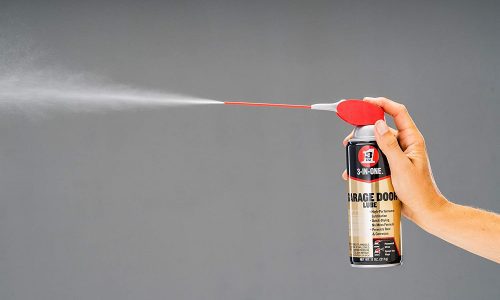how to lubricate garage door

A garage door works hard every day since it opens and closes more than a thousand times a year. It also keeps your belongings and equipment safe. This means the friction on the parts from constant usage might lead to squeaky garage door noises. A noisy garage door can be embarrassing to your neighbors. You might want to ignore it, wishing the noise would be gone for good. However, the noise won’t be going away soon until you do something about it. In fact, lubricating a garage door is often overlooked by homeowners. It’s a crucial step to allow for a seamless garage door operation. If you’re encountering a squeaky garage door, read more about how to lubricate the garage door properly.
Choosing the Best Lubricant for your Garage Door
Now that you’re all set to lubricate your garage door, you should first know how to choose the best garage door lubricant. When it comes to garage door lubes, it’s essential to look for white lithium or silicone-based sprays. For silicone, it comes with a thin and long straw that is attached to the container. The attachment is helpful if you’re trying to lubricate the tiniest parts of the garage door. This is a recommended lubricant since it can withstand varying temperatures. White lithium grease is a hand-application lubricant that allows you to spread onto the garage door parts evenly. It applies well to metal surfaces and is made of oil and soap. It’s also non-corrosive.
On the other hand, use an aerosol spray if you want to lubricate the small moving parts. Lastly, avoid standard lubricants such as WD-40 or mechanical grease. The reason is these products invite more dirt and dust.
Reminders Before Lubricating the Garage Door Parts
Before you grease your garage door, it’s essential to perform a maintenance checklist. These are the things to do before you lubricate everything:
• Tighten Everything
See to it that the nuts and bolts snug tight. Hence, avoid over-tightening them. Also, tighten the chain if it starts to make slapping sounds.
• Check The Rollers & Hinges
Worn-out hinges can cause noise to the operation of your garage door. Make sure to replace them once they wear out. On the other hand, rollers should not wobble since they could contribute to the annoying noise coming from your garage door.
• Clean All Non-Moving Parts
It’s essential to inspect and clean everything before lubricating every part of your garage door. Make sure to remove the debris on the rollers, tracks, springs, and non-moving parts. Either use a towel, dry brush, or a broom handle to remove the dirt.
The Lubricating Process
Once you have grease for the garage door, you should immediately use it to remove the squeaky noise. Thus, follow this guide on how to lubricate your garage door.
• Lubricate The Springs
Garage door springs are prone to expansion and contraction with each use. So, to avoid them from damage, you need to lubricate them. First, locate the springs in your garage door. Then, apply a lubricant on the entire surface. For best results, use white-lithium grease to cover them quickly.
• Lubricate The Rollers
Next, find the rollers on your garage door. They are located at the side portion of the door. They are made of plastic or metal, which roll through the tracks as the door moves. Once you spot them, lubricate the rollers, specifically on the part where the bearing lies. Since rollers and their bearings are challenging to grease by hand, use a silicone-based lubricant.
• Lubricate The Hinges
The hinges allow your garage door to fold and unfold. They also connect each part of the garage door. Hence, they are responsible for connecting every part to make the operation possible. If the hinges are wearing out already, apply a white lithium or silicone spray to smooth them out. On the other hand, choose the best grease for the garage door such as white lithium grease. This is to avoid the silicone spray drip between the panels.
• Lubricate The Locks
All garage doors have locks. However, they are prone to sticking and freezing depending on the weather. Apply a silicone-based spray to the locks to ensure they’re functioning seamlessly. The thin nozzle of the spray makes it easy to reach into the locking mechanisms. After lubricating all the moving parts, carefully wipe the excess grease with a towel or rag. In this way, no dirt and dust will build up into these parts.
• Test Your Garage Door
After cleaning and lubricating the garage door, open and close it several times. In this way, the grease is evenly distributed over the surfaces. If you still hear squeaky noises, apply more oil or inspect other parts that you forgot to lubricate. Then after you test the door again, there should be no more squeaking sound.
A Well-Lubricated Garage Door
A garage door has an impact on your home’s curb appeal. For this reason, it should be in good shape so you won’t experience any inconveniences in the future. Not only is a squeaky garage door annoying, but it can cause damage to the operation itself. Hence, you need to pay attention since the damages will lead to repairs and maintenance. With regular lubrication, your garage door will last for several years to come. While you’re at it, be careful when lubricating the garage door parts. Make sure you avoid leaning on the track since it’s prone to moving. Because of this, we recommend you grease the parts when the weather is cold.
Also, make sure to hit the bearings and the tiny little spots of the garage door parts when doing the process. First, make sure to lubricate the hinges thoroughly. Then, grease the points where the hinges open and close. Don’t forget to apply oil to the plates, arm bar, and locks. While we recommend lubricating the springs, it’s better to leave them to the professionals. The reason is the springs are under high tension. Hence, lubricating them will pose a safety risk. These are steps you can do to make your garage door move smoothly again. Follow them carefully to avoid safety hazards and mistakes. Then, you can finally say goodbye to the garage door squeaking!
